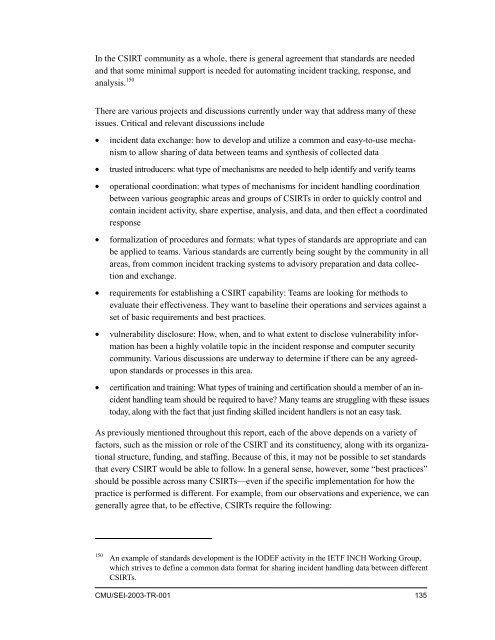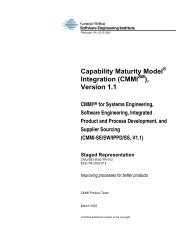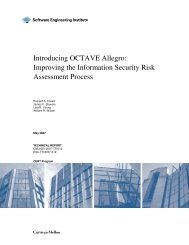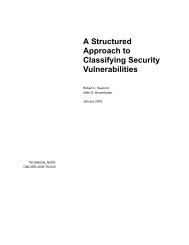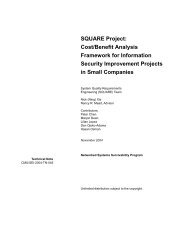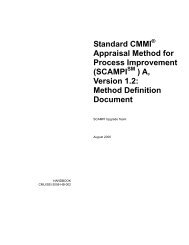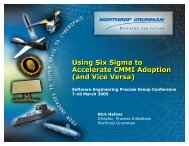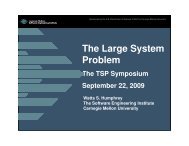State of the Practice of Computer Security Incident Response Teams ...
State of the Practice of Computer Security Incident Response Teams ...
State of the Practice of Computer Security Incident Response Teams ...
Create successful ePaper yourself
Turn your PDF publications into a flip-book with our unique Google optimized e-Paper software.
In <strong>the</strong> CSIRT community as a whole, <strong>the</strong>re is general agreement that standards are needed<br />
and that some minimal support is needed for automating incident tracking, response, and<br />
analysis. 150<br />
There are various projects and discussions currently under way that address many <strong>of</strong> <strong>the</strong>se<br />
issues. Critical and relevant discussions include<br />
• incident data exchange: how to develop and utilize a common and easy-to-use mechanism<br />
to allow sharing <strong>of</strong> data between teams and syn<strong>the</strong>sis <strong>of</strong> collected data<br />
• trusted introducers: what type <strong>of</strong> mechanisms are needed to help identify and verify teams<br />
• operational coordination: what types <strong>of</strong> mechanisms for incident handling coordination<br />
between various geographic areas and groups <strong>of</strong> CSIRTs in order to quickly control and<br />
contain incident activity, share expertise, analysis, and data, and <strong>the</strong>n effect a coordinated<br />
response<br />
• formalization <strong>of</strong> procedures and formats: what types <strong>of</strong> standards are appropriate and can<br />
be applied to teams. Various standards are currently being sought by <strong>the</strong> community in all<br />
areas, from common incident tracking systems to advisory preparation and data collection<br />
and exchange.<br />
• requirements for establishing a CSIRT capability: <strong>Teams</strong> are looking for methods to<br />
evaluate <strong>the</strong>ir effectiveness. They want to baseline <strong>the</strong>ir operations and services against a<br />
set <strong>of</strong> basic requirements and best practices.<br />
• vulnerability disclosure: How, when, and to what extent to disclose vulnerability information<br />
has been a highly volatile topic in <strong>the</strong> incident response and computer security<br />
community. Various discussions are underway to determine if <strong>the</strong>re can be any agreedupon<br />
standards or processes in this area.<br />
• certification and training: What types <strong>of</strong> training and certification should a member <strong>of</strong> an incident<br />
handling team should be required to have? Many teams are struggling with <strong>the</strong>se issues<br />
today, along with <strong>the</strong> fact that just finding skilled incident handlers is not an easy task.<br />
As previously mentioned throughout this report, each <strong>of</strong> <strong>the</strong> above depends on a variety <strong>of</strong><br />
factors, such as <strong>the</strong> mission or role <strong>of</strong> <strong>the</strong> CSIRT and its constituency, along with its organizational<br />
structure, funding, and staffing. Because <strong>of</strong> this, it may not be possible to set standards<br />
that every CSIRT would be able to follow. In a general sense, however, some “best practices”<br />
should be possible across many CSIRTs—even if <strong>the</strong> specific implementation for how <strong>the</strong><br />
practice is performed is different. For example, from our observations and experience, we can<br />
generally agree that, to be effective, CSIRTs require <strong>the</strong> following:<br />
150<br />
An example <strong>of</strong> standards development is <strong>the</strong> IODEF activity in <strong>the</strong> IETF INCH Working Group,<br />
which strives to define a common data format for sharing incident handling data between different<br />
CSIRTs.<br />
CMU/SEI-2003-TR-001 135


